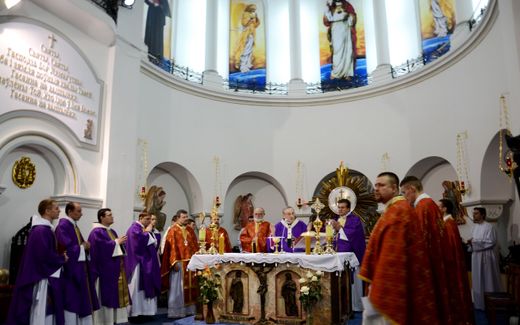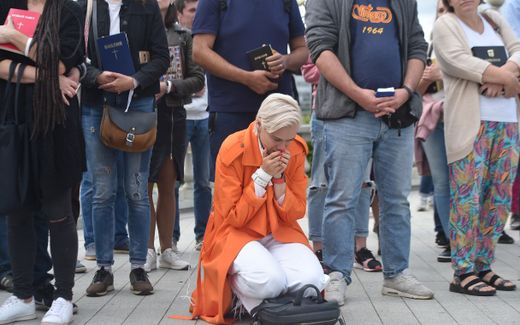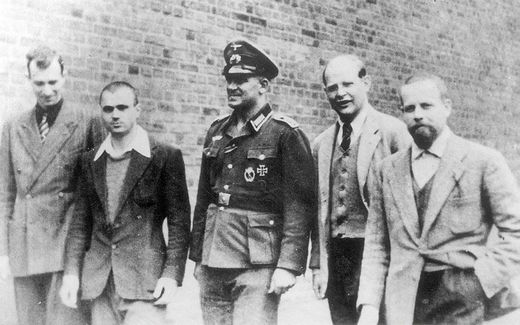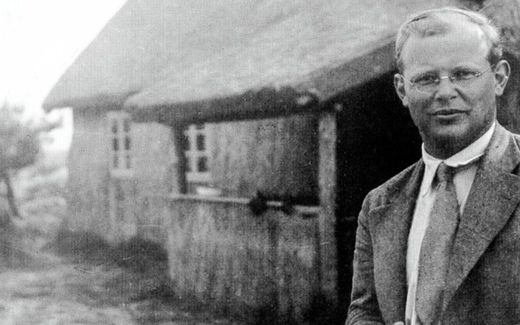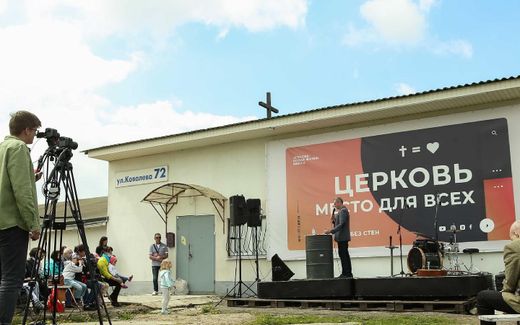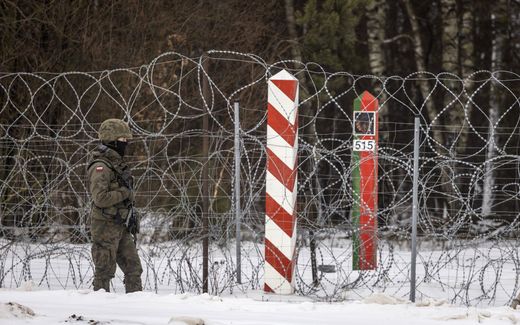“Belarus has its own Bonhoeffers”
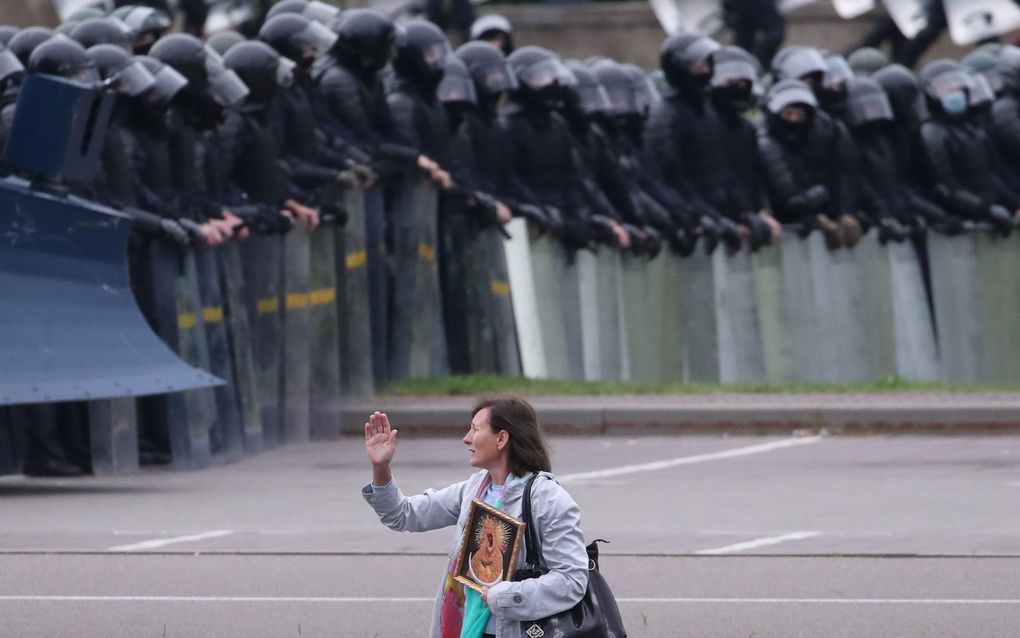
A protestor with an icon makes a cross in front of a line of Belarus soldiers defending the president's office during a protest march against president Alexander Lukashenko in 2020. Photo EPA, Tatyana Zenkovich
Eastern Europe
Christians in Belarus suffer from the oppression of the Lukashenko regime. But because of the repression within the country, fellow Belarusians abroad should be their voice.
When the police came, it looked like they had to arrest a terrorist. Armed with machine guns, they kicked in the flat door and held the suspect at gunpoint. The latter had to lie on the ground, after which officers handcuffed her.
But despite the police’s show of force, 44-year-old Valeryia Charnamortsava was not a terrorist. Her crime was organising guided tours of Stalin’s 1937 mass execution sites. Or, in the terminology of the Lukashenko regime: organising and preparing actions that disturb public order.
The now 45-year-old Charnamortsava told her story at a conference organised by several MEPs at the European Parliament in Brussels. There, she spoke about living as a Christian under the Lukashenko regime.
After Charnamortsava was handcuffed, she was allowed to put on clothes in exchange for her phone code. She had to make do with that set of clothes for over two months. After police officers stole some of her money, she was taken away and ended up in the Belarusian judicial system.
Gospel
Charnamortsava recounts her treatment of Belarus’ judicial system in descriptions that sometimes emote the interpreter. For example, she regularly had to share her two-person cell with more than seven people, sometimes as many as 19. Although she occasionally lost consciousness, she was not allowed to get medical assistance. The Christian was also prohibited from taking a small gospel book inside her prison cell.

Christians are forbidden to commemorate their holidays in prison, Charnamortsava says. “Especially around Christmas and New Year, there are strict checks. Even paper Christmas trees are confiscated then.” Furthermore, Charnamortsava was banned from seeing a priest or participating in communion.
According to Charnamortsava, Belarus is one big prison. The 45-year-old researcher knows quite a bit about Stalin’s gulags and thought she was somewhat prepared for a possible arrest. But she was not, she says. The brutality with which the Belarusian regime operates “has changed little from the Soviet period.”
Soviet
As the only former Soviet republic, Belarus still has a Commissioner for Religious Affairs. He determines what happens in church matters. In 2018, for example, then-Commissioner Gulyako demanded from the Catholic bishop that Viachaslau Barok, also present at the conference, keeps his online comments on social justice to himself from now on. As time progressed, Barok had to flee Belarus. He continues his pastoral work in Poland today.
But it is not only minority religions that are experiencing the influence of the Lukashenko regime. The Orthodox Church, representing over 80 per cent of the faithful, also faces repression. However, this is somewhat different because of the close ties between the church and the state. “As in Russia, the Orthodox Church in Belarus is very pro-government,” explains Orthodox priest Uladzimir Drabysheuski. “After the 2020 elections, Patriarch Kirill (of Moscow, LN) and metropolitan Vienijamin were quick to congratulate Lukashenko.”
Those elections are a black page in the history of Belarus. After Lukashenko was re-elected with more than 80 per cent of the vote by his own admission, the opposition contested this result. The European Union also questioned it. Mass protests were harshly crushed by the authorities, regularly resulting in deaths.
Spitting
During this period, Drabysheuski decided to turn against his own Church. By supporting Lukashenko, says the 43-year-old, “the Church was spitting on the Christian principle of justice.” So the father of six went to demonstrate himself.
Armed with a sign calling for an end to the violence, the priest shows up on the streets. There, he gets a lot of support from people. “People wondered where other priests were staying,” he says.

Despite his risky venture, Drabysheuski is not immediately arrested. Even though the authorities follow him, the priest is able to continue his protests. That changes after his children are pressured at school. “Policemen in plain clothes wanted to take my son away from school. They succeeded once.”
Not long after, Drabysheuski himself is also arrested. After being detained for several dozen days, he leaves Belarus with his family. He flees to France, where he receives political asylum.
According to Drabysheuski, the Orthodox Church in Belarus is an extension of the Lukashenko regime. “Anyone who does not cooperate will be expelled from the church,” he said. According to Drabysheuski, Archbishop Artemy, who died at Easter, was one of the few who dared to speak out against the violent regime. The man had to pay for that with his position; in 2021, Artemy was forcefully retired.
Bonhoeffer
Sharing these kinds of testimonies is important, argues Vital Rymasheuski. He is a former presidential candidate and co-chairman of the Christian Democratic Party “Belarusian Christian Democracy” (BCD). “In Belarus, Christians and other citizens can do little to speak out. Speaking out ensures that the regime is at your doorstep. That is why Belarusians in exile must be their voice.”
Although the Orthodox Church is in some ways complacent to the government, Rymasheuski also points to imprisoned priests. When asked by a German MEP, the Belarusian answers by saying that “Belarus has its own Bonhoeffers.”
External pressure from other countries also helps improve Belarusians' life in their country, says Rymasheuski. As an example, he cites a signature campaign some ten years ago. “We collected 50,000 signatures for the European Parliament to promote freedom of conscience in Belarus. When they received it, it caused relief in Belarus. Rymasheuski says he hopes this conference will start an international campaign around awareness of Belarus.
But besides politicians, can European Christians do anything to help their Belarusian brothers and sisters? Yes, says Rymasheuski. “Write letters to political prisoners, help with crowdfunding campaigns and approach your politicians.”
According to Rymasheuski, the West must be careful not to create an “iron wall” between Belarus and the West. “Know that most of the Belarusian population does not support Lukashenko and is against the Russian invasion of Ukraine. Belarus is not the same as Lukashenko.”
Related Articles


